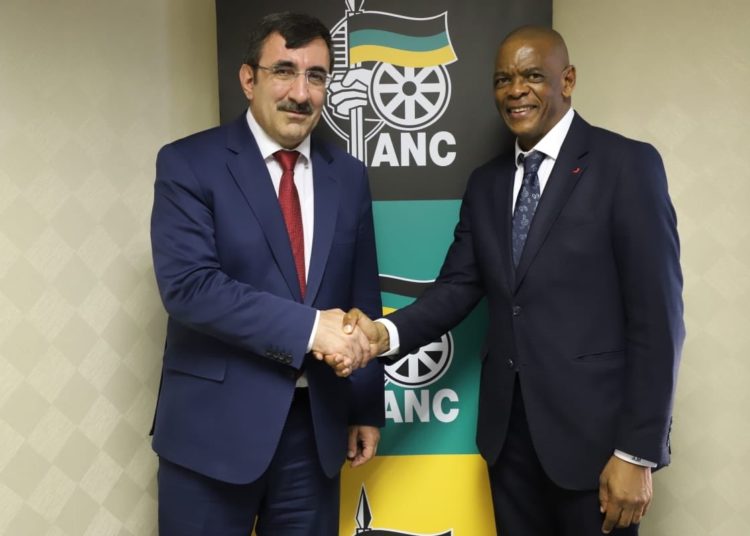The African National Congress (ANC), South Africa’s governing political party, has increasingly become the subject of criticism at home for its open support of Turkish President Recep Tayyip Erdoğan’s government in the wake of Turkey’s recent military incursion into Syria, viewed by many as the ANC overlooking Turkey’s human rights violations.
The National Education, Health and Allied Workers’ Union (NEHAWU), the largest public sector union in South Africa, issued a statement following its 5th Plenary Session of the National Executive Committee on October 31 saying that the union is deeply concerned by the ANC decision to conclude a memorandum of understanding (MOU) with “Turkey President Erdogan’s AKP [Justice and Development Party], a political party completely the opposite of the ANC.”

Expressing its solidarity with the Kurds, the union statement read, “It is our view that the solution to this blunder and to preserve Madiba’s legacy,” referring to former president of the ANC Nelson Mandela, who had declined a peace prize from Turkey on the grounds that human rights violations were committed against the Kurds in Turkey, was for the ANC to rescind the signed memorandum.
The union also announced that its members would participate in demonstrations across South Africa during the week of November 2 to protest the aggression of the Turkish government.
Political commentator S. Ivan Phahle wrote on South African’s leading news platform and in Sunday newspaper The City Press that the ANC’s recent dealings with President Erdoğan’s Islamist party in Turkey had raised eyebrows as far as the Kurdish policy adopted by the ANC was concerned.
Bringing to mind the ANC’s previous resolution in favor of Kurds and its urging of all role players to engage for a political solution to the conflict during its 2017 policy conference in Nasrec, Phahle added that “[it] seems though that the ANC has forgotten and is contradicting the 54th resolution that stated that the ANC supposedly supports the Kurdish people’s struggle for human and political rights.”
“How is it that the ANC is being ignorant of the human rights violations the AKP is implicated with and still proceeded to make deals with Turkey?” asked Phahle.
Mahmoud Patel, a professor at the University of the Western Cape, told South Africa’s The Daily Vox on October 16 during a peaceful protest outside parliament in Pretoria that South Africa has a policy on the Kurdish struggle and that it’s part of the country’s foreign policy.
“It was adopted like it is for Palestine, Western Sahara, and Sahrawi as well,” said Patel.
“We want the South African government to take diplomatic and political stances to say no to human rights abuses committed by Turkey against the indigenous people. We want South Africa to put pressure on the Turkish Government to stop the invasion.” Patel added, suggesting that Turkish Embassy in South Africa be downgraded.

Turkish Ambassador to South Africa Elif Çamoğlu Ülgen on October 15 penned an article for the Pretoria News, a local newspaper owned by the Independent Media group, in order to relate the Turkish government’s arguments on the military operation in Syria; however, the article only appeared in the hard copy of the newspaper. The paper’s management apparently decided not to publish it online for unknown reasons. A source told Nordic Monitor that most likely the newspaper was trying to avoid more reactions from readers.
Amid criticism, the ANC continues to develop relations with its Turkish counterpart. Zweli Mkhize, minister of health and a member of parliament, visited his counterpart, Minister Fahrettin Koca, and AKP Deputy Chairman for Foreign Affairs Cevdet Yılmaz on October 31 in Ankara.
A member of Socialist International, the ANC had signed an MOU with Turkey’s ruling Islamist AKP on August 1, 2019 in Ankara during an ANC delegation visit to Turkey.
Finally, a large AKP delegation led by Cevdet Yılmaz was welcomed at ANC headquarters in Pretoria on November 4. Ace Magashule, secretary-general of the ANC, also hosted a dinner in honor of the visiting delegation at which the delegates celebrated Magashule’s 60th birthday. Along with AKP members, Turkish Ambassador Ülgen and Birol Akgün, chairman of Turkey’s semi-official Maarif Foundation, which operates educational institutions overseas in accordance with the Erdoğan government’s Islamist agenda, were also present during the visit. The ambassador preferred not to take part in a family photo with the delegation; however, she tweeted a photo of herself in front of a giant ANC logo, writing that it was the first time she had posed at a political party building, when in fact Turkish ambassadors act as AKP operatives in order to curry favor with the administration.

Scandalously, Akgün had participated in a communications strategy workshop on the Turkish military incursion into Syria organized by the presidency on October 14 along with officials from the National Intelligence Organization (MİT), Ministry of Defense and Ministry of Interior, a clear indication that Maarif is a tool for political propaganda rather than an educational organization.
Nordic Monitor previously revealed that Maarif is branded as a pet project of Turkey’s Islamist President Erdoğan and serves as his regime’s long arm abroad in providing educational services as part of a campaign of proselytization. It also aims to raise a new generation of political Islamist activists to mobilize around Erdoğan. Video footage has emerged from Africa and other parts of the world that shows students at Maarif-linked or supported schools chanting and praying for Erdoğan during Turkey’s military operation in Syria.

Maarif’s management is filled with partisans and Islamists, some of whom have connections to the Foundation for Human Rights and Freedoms and Humanitarian Relief (İnsan Hak ve Hürriyetleri ve İnsani Yardım Vakfı, or IHH), a charity organization that is linked to radical armed groups including al-Qaeda in Syria and Libya.
An ANC member previously told Nordic Monitor that close relations with Erdoğan and his party are not good for South Africa on international platforms and will damage efforts to conduct foreign policy, in which human rights will remain a central theme in interactions with other countries.












